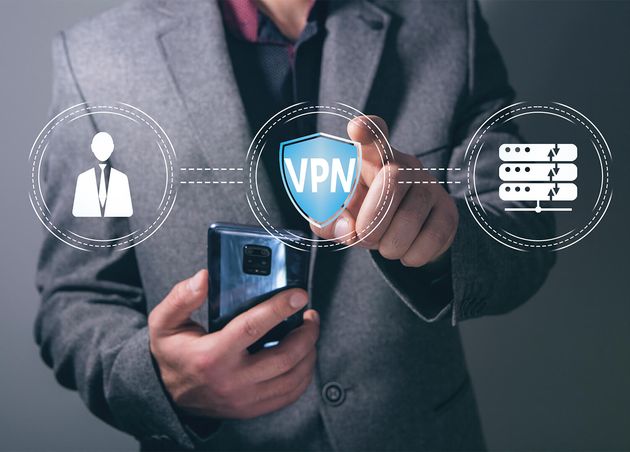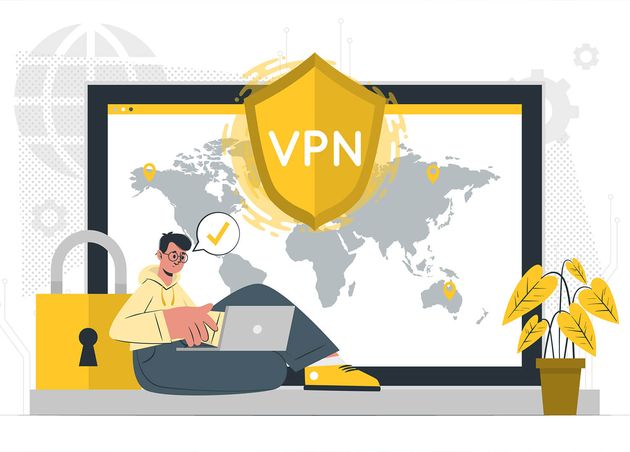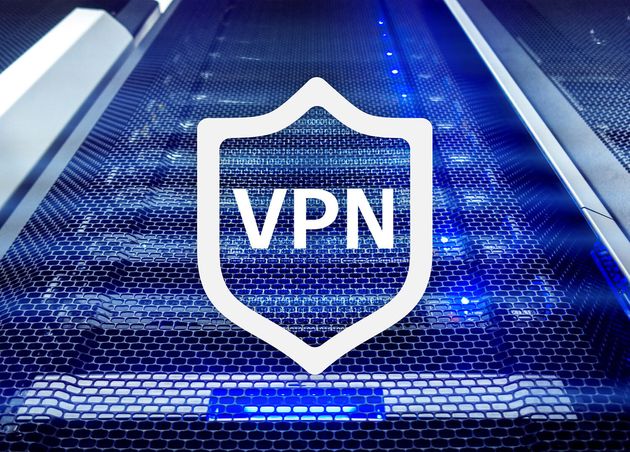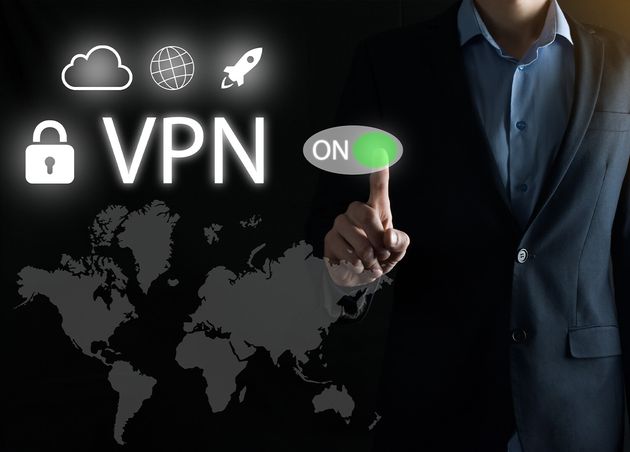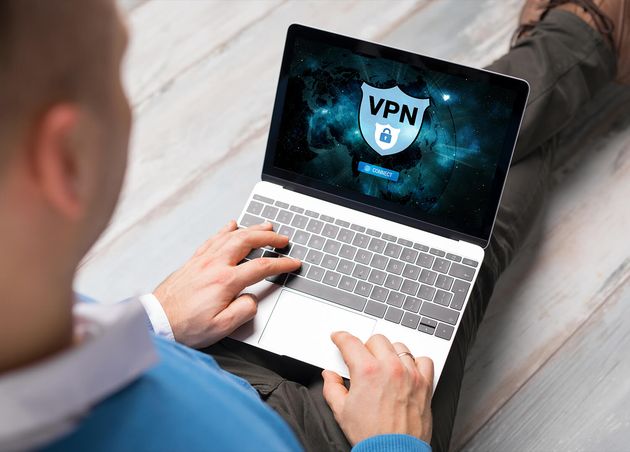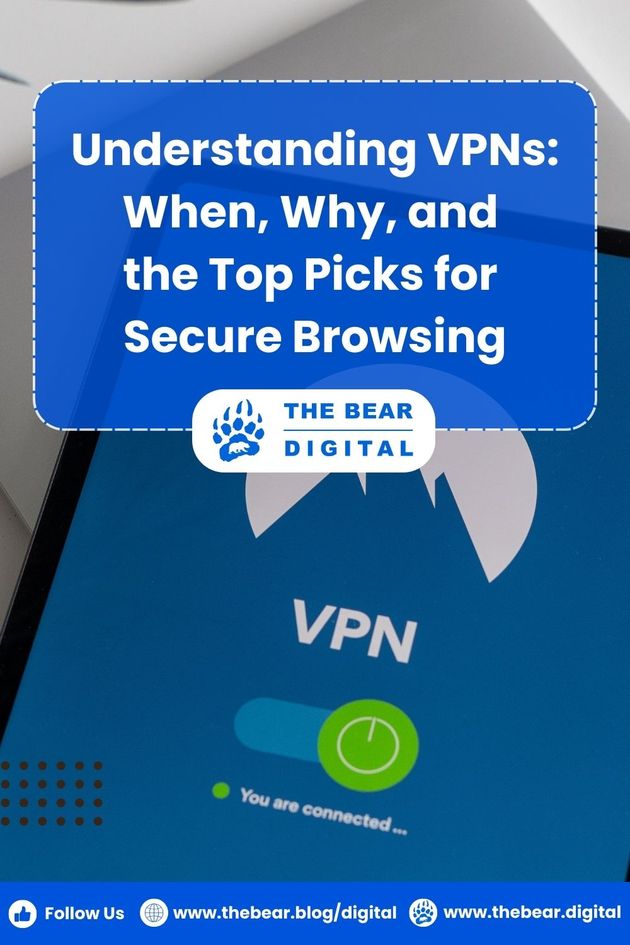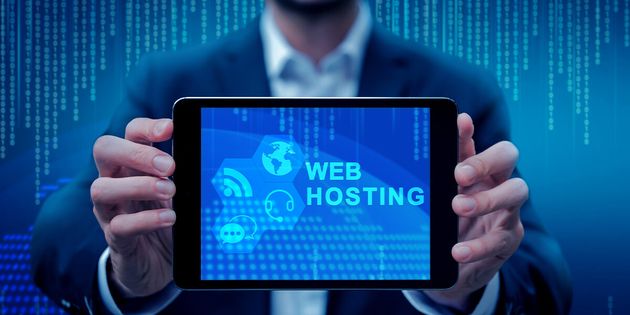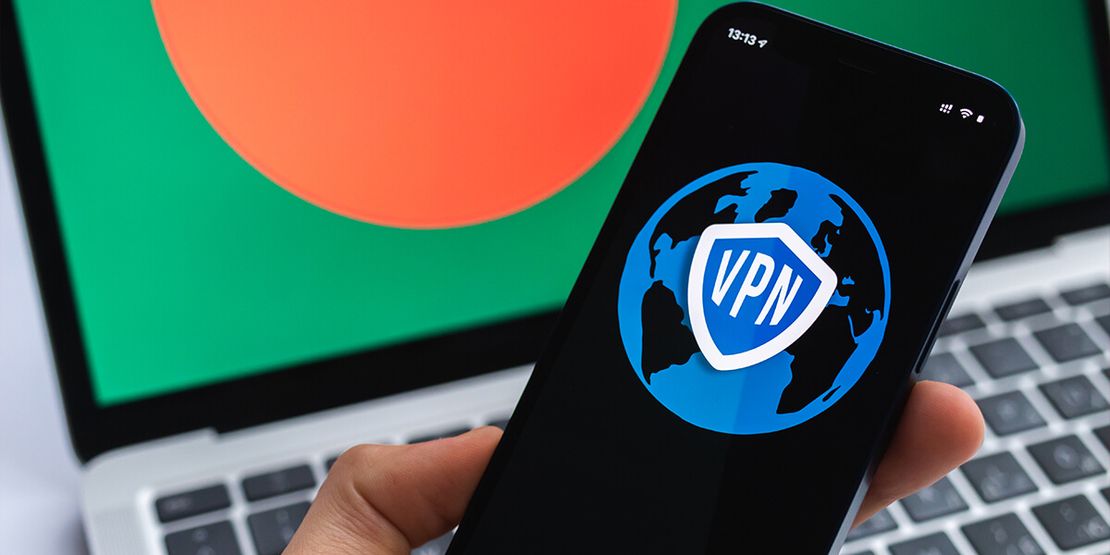
Understanding VPNs: When, Why, and the Top Picks for Secure Browsing
A VPN, known as a virtual private network, creates a point-to-point tunnel connecting your computer to a remote server operated by any VPN service provider. This process encrypts your private information, masks your IP address, and enables you to bypass website blocks and firewalls on the Internet. This guarantees the privacy, safety, and security of your online activities.
A VPN connection, by definition, is:
- Virtual because there are no physical wires involved in the connecting procedure.
- Private because nobody else can view your data or surfing activities through this connection.
- Network because many devices—your computer and the VPN server—work together to keep the connection open.
A VPN benefits anybody looking for a safer, more accessible, and secure internet experience. A VPN secures its customers' data and masks their IP address, making their browsing history and location untraceable. This increased anonymity allows for better privacy and freedom for people accessing restricted or region-bound information.
Now that you understand the meaning of a VPN and what it stands for, let's look at its various benefits and why it would be beneficial.
💻 Tech Fact!
VPNs were initially established in the late 1990s.
Reasons Why You Should Utilize a VPN
#1 Secure Your Data
Business emails, financial information, and location tracking are all continually relayed online. This information is easily trackable and exploitable, especially on a public network, where anyone with network access can access your private information. A VPN connection scrambles your data into code, making it unintelligible to anybody who does not have an encryption key. It conceals your surfing behavior so that nobody can see it.
#2 Work From Home (WFH)
Remote employment is becoming more common than ever before. Remote workers can use a VPN anytime to access business resources from anywhere as long as they can access the Internet. This gives employees more freedom to ensure corporate data is secure, even while using a public Wi-Fi network.
#3 Access Content from Anywhere
Some websites and services limit their media content based on your geographic location, which means you may be unable to access certain information. A VPN masks, or spoofs, the location of your local server, making it appear to be located somewhere else, such as another nation.
#4 Bypass Censorship and Surveillance
Due to government limitations, censorship, or monitoring, some locations may not have access to specific sites or services. Location spoofing allows these individuals to bypass firewalls, access banned websites, and travel freely online.
#5 Prevent ISP and Third-Party Tracking
Internet Service Providers (ISPs) use your device's unique IP address to log and trace your browsing history. This data might be sold to third-party advertising, provided to the government, or left susceptible to a security breach. A VPN masks your IP address, stops ISP tracking, and keeps your data private by routing to a distant VPN server rather than your ISP's servers.
Advantages When Using a VPN
VPNs can provide a secure mode for online browsing by protecting your privacy and data. When used properly, a VPN helps encrypt your connections and secures your device from strangers.
Apart from security, various additional advantages make this service worthwhile. Here are some of the most common reasons individuals use VPNs at home or work.
#1 VPNs Offer Safety and Security
The first and most important reason people use VPNs is for security. It establishes an encrypted tunnel for data flow between your device and the host site. This removes the chance of someone listening in or probing into your data. Even your internet service provider is unable to view or trace your data.
#2 VPNs Give You Anonymity
Another vital reason individuals use VPNs is to protect and maintain their anonymity. VPN enables its customers to access the Internet from several server locations. In this manner, all traffic is diverted to and from the server, and your precise location and identity are hidden even from the host site. Because no one can track your information using your data, anonymity can also assist in defending you from targeted attacks via the Internet.
#3 VPNs Enables Circumvent Geo-restrictions
VPN enables customers to bypass geographical limitations and access the Internet from anywhere globally via its distant servers. This gives you access to websites and channels for entertainment that may not be available in your area.
#4 VPNs Allows You to Save Money
Many online shops provide distinct pricing lists for customers from different locations. The same is true with airline tickets. To counteract this regional bias, you may buy online and compare flight fares by connecting to VPN servers in different areas. This will definitely assist you in obtaining the greatest deals at the best prices.
While it may be complicated and exhausting, you can save significant money. If you already have knowledge of subsidized prices for a specific nation or state, you may just select that country's server and save both time and cash.
#5 VPNs Improve Cybersecurity
Although public Wi-Fi is often free and widely available, it is connected with many security risks, such as data breaches and malware attacks. These security issues render it unfit for personal or commercial usage. In many scenarios, it is hard to avoid public Wi-Fi, especially if you are away from your city and state or live where private internet connections are too expensive.
In these situations, a VPN is handy since it provides a safe and secure tunnel for your online activity while also masking your identity when utilizing public Wi-Fi. While VPN use is becoming increasingly popular for the above reasons, some drawbacks exist.
💻 Tech Trivia
Depending on where your flight arrives and departs, you may receive varying rates when purchasing tickets from different destinations.
Top 5 Paid Virtual Private Networks (VPNs)
#1 NordVPN
NordVPN is the best privacy VPN available. Its security features are impressive: it employs AES-256 encryption, has a solid kill switch, RAM-only servers, Dark Web Monitoring, Threat Protection, and more. In terms of privacy, it also has an approved no-logs policy. NordVPN routinely ranks among the fastest VPNs we've tested, retaining up to 90% of original internet connections on average, allowing for smooth browsing, streaming, and downloading.
NordVPN's pricing starts at $3.19/month if you sign up for the yearly plan. It's worth noting that monthly billed subscriptions are more expensive, beginning at $12.99/month so that long-term deals may provide better value. If you don't like the service or simply want to test it out, there's a 30-day money-back guarantee and a 7-day free trial option.
#2 Surfshark
Surfshark includes all the security features a professional security solution should have. It uses unbreakable AES-256 encryption and has a no-logs policy that has been audited. Surfshark also provides RAM-only servers, Camouflage mode, NoBorders mode, CleanWeb, Multihop, and the most current feature - Nexus network, which can provide additional levels of security when using the VPN. Surfshark caters to torrent fans by providing P2P-friendly servers.
Following that, the service provides server obfuscation and double VPN capability. Android also has a virus blocker, split tunneling, and GPS spoofing. Furthermore, capabilities such as whitelisting can be useful in various ways. Surfshark VPN is reasonably priced. While the monthly package isn't as inexpensive as its competitors ($5.99/month), the 2-year offer starts at $2.30/month, which is nearly unbeatable for the quality you get.
#3 Atlas VPN
Atlas VPN is a well-known provider that offers a free plan and premium services. While it does not aim to be the fastest or most secure, its balanced approach gives a dependable solution that will suit the demands of a wide range of users. Atlas VPN's use of the WireGuard protocol improved its performance in terms of speed. It is currently one of the fastest VPNs on the market, keeping up to 80% of original speeds on average - making it an excellent choice for streaming, playing video games, and other activities.
Atlas VPN's pricing is competitive, starting at $1.82/month for limitless simultaneous connections. Even though it lacks the extensive server infrastructure and feature set of NordVPN or Surfshark, it nevertheless provides the necessities.
#4 Express VPN
ExpressVPN is a popular VPN service among both consumers and professionals. The supplier places a high priority on providing its customers with long-term security and privacy. On the other hand, users highlight the high quality of service they provide. This includes little impact on connection speed as well as fantastic streaming capabilities. Because of these advantages, people worldwide prefer ExpressVPN despite its higher monthly fees.
It has industry-leading privacy and security features, can unblock nearly any streaming site, and is extremely simple. Its 30-day money-back guarantee allows you to try the service risk-free, and Tom's Guide readers can get three months free - plus a year of software for backing up from Backblaze.
#5 Private Internet Access
Private Internet Access has been around for a long time. Still, unlike other VPN dinosaurs, it has remained on an upward trend rather than succumbing to the new guard. Indeed, it has ascended to fourth position since our last Private Internet Access assessment. While PIA does not reveal the size of its server network, we estimate it to be approximately 20,000 servers, making it the most server-rich service on the market. When you combine it with the 84 accessible nations, you get quite a spread.
PIA, or Private Internet Access, proves its excellence when you delve deeper. Notably, its desktop programs support the uncommon port forwarding feature, and its kill switch is notably stable. PIA is a recommendation for those searching for a feature-rich and dependable service at a reasonable cost. The added benefit is a 30-day money-back guarantee, providing a risk-free opportunity to explore its offerings.
Top 5 Free Virtual Private Networks (VPNs)
#1 PrivadoVPN
PrivadoVPN Free has been nipping at Proton's heels for a long time. With recent advancements, it has finally dethroned the long-standing Swiss champion. It's one of the only VPNs with a specialized geoblocking team that can reliably unblock significant streaming services like Netflix and BBC iPlayer—most premium providers can't offer that.
The free platform even allows you to access local services while watching your favorite shows from overseas. You may even change your encryption protocol and use WireGuard for a quicker, more secure VPN connection. Privado is unique in that it manages its own bandwidth and transit lines. This means you get excellent speeds and no server congestion—a free service that feels premium.
#2 Proton VPN
Because of its unique combination of features, power, and software quality, Proton VPN Free used to be at the top of our Best Free VPN reviews. While it has lost its luster, it is still a fantastic service that does not impose constraints and restrictions to force you to upgrade. This is a free VPN that you may use indefinitely.
For example, there are no data limitations with Proton. While practically all free VPNs limit you to 500 MB to around 10 GB of data per month, Proton VPN Free provides limitless bandwidth. That's convenient but also a significant privacy benefit because you don't have to pick where you use the VPN when your data runs out. If you suspect a risk or are unsure, just connect—Proton VPN Free is always available.
#3 Windscribe
Windscribe Free VPN, a top-tier Canadian service, boasts an enticing feature set that solidly secures its position among the best. Despite a slightly lower data allotment compared to the top two VPNs, standing at 10 GB per month, it proves ample for safeguarding most online activities. Windscribe Free VPN has advantages that compensate for the data limit. Most free plans limit you to one connection, but Windscribe has no such restrictions: you may install and use it simultaneously on as many devices as you need.
There are some unexpected pluses as well. Even though Windscribe Free VPN does not feature the Windflix dedicated streaming servers, we could successfully unblock UK Netflix and BBC iPlayer. I enjoy how it doesn't overlook unblocking stuff for non-paying clients.
#4 Atlas VPN
Atlas VPN Free caught our attention with its notably generous data allotment, particularly for Mac VPN clients, who could enjoy an impressive 2 GB daily. While the service has undergone an independent audit, giving it an edge over many competitors, its coverage is somewhat restricted, focusing primarily on the iOS app. On the other hand, TunnelBear Free VPN conducts annual audits across its applications, servers, infrastructure, and other systems. Despite limitations, Atlas VPN Free pleasantly surprised us by surpassing expectations in certain aspects, such as accessing Disney Plus, even though it doesn't explicitly support unblocking streaming sites.
#5 Hotspot Shield Basic VPN
Hotspot Shield Basic is a popular free VPN package with a significant advantage. Hotspot Shield began improving the service last year to provide unlimited bandwidth across all platforms. In a world where most free VPNs limit you to 10 GB per month or less, using the service as much as you like is a significant advantage.
However, compared to its competitors, Hotspot Shield provides a subpar service.
Virtual Private Networks (VPNs) are pivotal in securing our digital experiences, offering a shield for online activities and ensuring privacy and security. Understanding the fundamentals of VPNs and their virtual, private, and networked nature emphasizes their significance in creating secure connections in an interconnected world. From safeguarding sensitive data to enabling remote work, bypassing censorship, and preventing tracking, VPNs prove versatile in enhancing online security and creating a safer digital landscape.
Tech Bear


